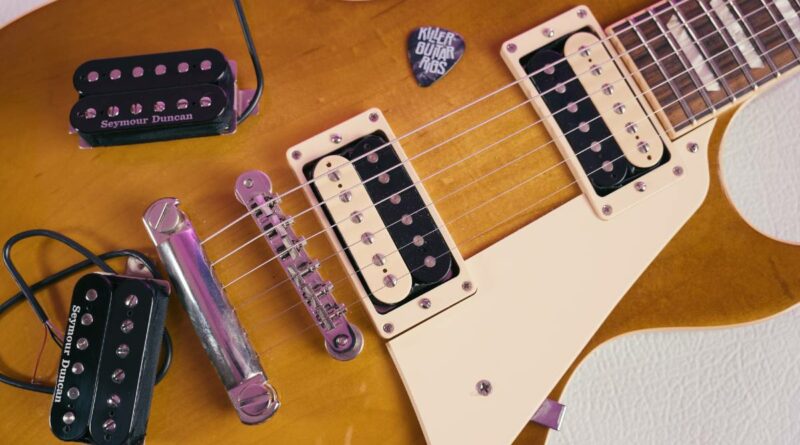Upgrading the pickups in your Les Paul to suit the genre you play is a great way to level up your sound.
One of the best things about owning Les Paul guitars is that there is huge aftermarket support available to upgrade or modify them. While the flagship Gibson models rarely warrant an upgrade, ‘Gibson-like’ Les Paul guitars or Epiphone models can often benefit from a pickup swap.
Whether you want to swap to a pickup that suits your style/genre or you want to upgrade from the muddy stock electronics of your Les Paul copy, a good aftermarket pickup is the most cost-effective way to transform these fantastic guitars.
There are a great deal of options for upgrading, and it can sometimes be tough to zero in on the right choice. In this KillerGuitarRigs Review, we’ve compiled a roundup of the best of P90s and humbuckers to supercharge your LP. We’ve highlighted models based on the genres they’re best suited to in order to help you make your decision.
If you’ve been looking to upgrade your Les Paul’s pickups, you won’t want to miss this.
- Seymour Duncan Pearly Gates – Best for Hard Rock/Alternative
- Seymour Duncan Hot Rodded Humbucker Set – Best for Modern Rock/Metal
- EMG 81/85 – Best for Thrash Metal
- Seymour Duncan SPH90 Phat Cat P90 – Best P90 Pickups for Les Paul
- Fishman Fluence Modern – Best for Modern Metal
- Seymour Duncan SH-55 – Best for Jazz/Blues
- Seymour Duncan Alnico II Pro Slash APH-2 – Best for Classic Rock
Read more about our review process.
Contents
Individual Reviews
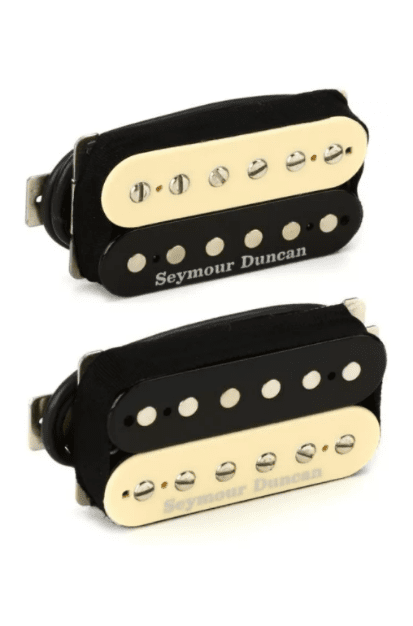
Seymour Duncan Pearly Gates
Hard rocking humbuckers with single coil clarity and a creamy midrange.
These pickups offer a fantastic blend of vintage warmth and modern, high output aggression. The mid range is unbeatable for hard rock, and the top end clarity ensures they they stand out in any mix.
The Seymour Duncan Pearly Gates pickups were named after one of the most iconic guitars in all of rock ‘n’ roll, Billy Gibbons’ 1959 Les Paul. These pickups were designed to replicate the Billy Gibbons tone, and we think they absolutely nailed it. They really captured the essence of classic rock and blues while simultaneously offering the kind of modern versatility that today’s players demand.
These Pearly Gates humbuckers gave us warm, rich tones that were absolutely dripping with vintage mojo. They offered an almost perfect balance of clarity and grit, making them ideal for a wide range of musical styles. We did find them to be hotter than most ‘vintage’ pickups but still not as powerful as modern high-output options.
The neck pickup produces creamy tones that we thought were perfect for everything from blues to a hard rock rhythm lines. The bridge pickup, on the other hand, gave us a muscular and punchy tone with enough bite to cut through any mix.
Whether you add them to a modest Epiphone model or a high-end Gibson model, the boosted high-mids, top-end sparkle, vintage richness, and additional clarity/volume of the Pearly Gates make them especially well-suited for alt-rock and hard-rock genres.
They gave us excellent sustain with treble-rich clean tones with plenty of harmonics. As an added bonus, they fit into coil-tapped guitars without any hassles.
Verdict: Seymour Duncan Pearly Gates pickups are as good, if not better than any other pickup trying to recreate the classic LP tone. Overall, the Pearly Gates humbuckers offer tons of clarity and fullness and pair well with all-mahogany Gibson or Epiphone models. Overall, they’re a great choice for anybody looking for quality pickups for their LP that can do a bit of everything.
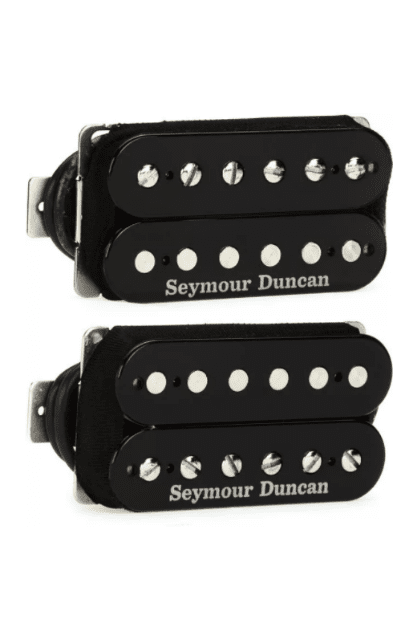
Seymour Duncan Hot Rodded Humbucker Set
A fantastic upgrade for muddy stock pickups.
If you're struggling to get the clarity and bite that you want from your Les Paul's stock pickups, these Duncan humbuckers are the perfect solution. They have a tight, focused bottom end and an incredible upper midrange that works perfectly for modern rock and metal.
The Seymour Duncan Hot Rodded Set came as a pre-packed combination of the Jazz Model (SH-2n) for the neck pickup and the JB (SH-4) humbucker for the bridge pickup. What we loved about this set was its ability to turn even the dullest LP clone into a well-defined, versatile workhorse.
The SH-2n (their Jazz model) was one of the best clean humbuckers we’ve ever used. Whether we were playing comping chords, single-note lines, or melodic solos, the SH-2n perfectly captured the nuances and dynamics of our playing. It served up a responsive and expressive tonal palette, and it gave us some gorgeous clean tones, delivering a bell-like clarity and excellent note separation. When pushed into overdrive or distortion, the SH-2n retained its clarity and definition, and still provided excellent balance with tons of character.
The SH-4 JB included in this set is, in our opinion, one of the best bridge pickups on the market for the Les Paul. It’s made with a ceramic magnet and had a moderate-to-high output, which gave us a great balance between rich harmonics and a strong, tight bottom-end response. It had a slightly scooped midrange, which contributed well to its ability to cut through the mix. The JB’s high output also allowed for smooth sustain and overdriven tones, which are two of the biggest reasons it’s become a staple in modern rock and metal.
We found this amazing combo of humbuckers covered just about all the sonic bases, giving our LP the juice it needed for a powerful, articulate, and versatile tone. They’ve served the likes of Randy Rhoads, Jeff Beck, and Seymour Duncan himself, so they’ll be right at home in your guitar.
Verdict: Say hello to glass and goodbye to mud. The Seymour Duncan SD hot-rodded set combines classic pickups that can transform any low-end Epiphone or even add value to a US-made Gibson. It’s our Top Pick for Modern Rock/Metal and all of the associated sub-genres, but don’t think these pickups are one-trick ponies. They really can do it all.
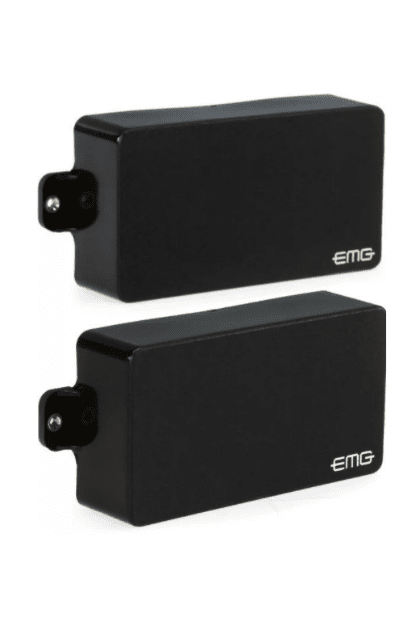
EMG 81/85
Legendary active pickups used by some of the biggest names in the Genre.
Players looking to emulate the searing tones of Slayer, Metallica, and Sepultura will find exactly what they're looking for in these EMG humbuckers. They feature powerful ceramic magnets for huge output and incredible high gain performance.
The EMG 81 & 85 (81/85) pickup combination needs no introduction to Les Paul players. It’s one of the most iconic metal pickup combos, famously used by thrash-metal icons like Kerry King, Gary Holt, and James Hetfield.
It is worth noting that the EMG 81/85 humbuckers are active, which is what allows them to remain so clear despite being super hot, but it also means they need a 9V battery to power them.
From aggressive riffs to rapid shredding, the 81/85 combo is associated with fat distortion and a thick low end. They feature as the stock pickups in many PRS, Jackson, ESP, and Schecter models, among others.
The EMG 81 is a high-output humbucker best suited as a bridge pickup. It had huge presence in the midrange frequencies and a really aggressive edge. We got amazing clarity, whether playing clean or with heavy distortion and found that it offered extremely tight focus and amazing sustain, making it particularly well-suited to heavier genres like metal and hard rock.
We installed the EMG 85 in the neck position and found that it gave us a smoother, warmer tone than the EMG 81. It delivered a massive lower mid-punch that made it perfect for thick, chugging riffs and rhythm lines.
Verdict: The EMG 81/85 is a legendary pickup combo. They may well be the perfect pickups for metal but don’t be too quick to typecast them. Their clear tones and amazing versatility means they perform well across a range of genres, from blues to country, as well as the heavier styles you’d normally associate them with.
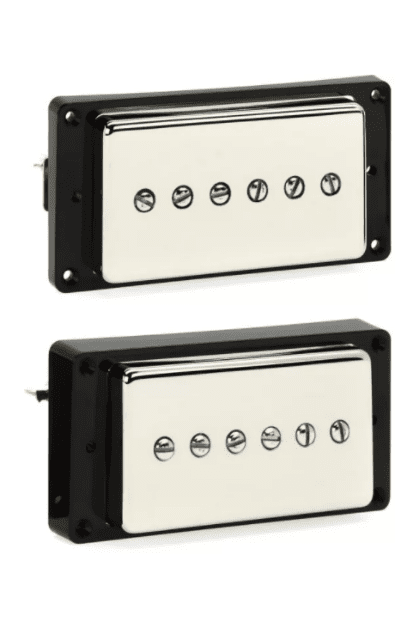
Seymour Duncan SPH90 Phat Cat P90
Quality pickups with unmistakable P90 Snarl.
With these P90s, you'll be able to swap out your stock humbuckers without needing to rout your guitar's body to accommodate new pups. They offer distinctive tones with more brightness than a humbucker, and more bite than a traditional single coil.
Whether you own a second guitar with humbuckers or you fancy more brightness in an LP tone, the Seymour Duncan SPH90 Phat Cats are an excellent choice to add P90-magic to your tone. They’re super popular in genres like country, punk, rock, and blues (check out our list of easy and fun country songs here), and we think you’ll find they make a huge difference over any stock humbuckers you may already have installed.
These weren’t the typical ‘soapbar’ design you’d normally associate with P90s. Seymour Duncan has made some huge improvements to their traditional design. For instance, they featured a silver-nickel bottom plate for noise-reduction, and vacuum-wax potting to prevent squeals, both of which were weaker points of the traditional P90 design.
Phat Cats are used in a number of P90 Gibson models, so if you do upgrade your guitar with them, you’ll be getting authentic tone. They were made with Alnico 2 magnets, which gave them a super punchy and crisp sound with plenty of clarity and sustain.
We found them to be bright but at the same time, noticeably warmer than the kind of single-coils you’d find on a Stratocaster or Telecaster. Like most P90s, they had that ‘bite’ in the midrange that cuts through the mix brilliantly. Their sweet, warm tones had a unique ability to make clean chords and arpeggios really sing, but when pushed hard, they still had the classic P90 Growl.
In the bridge position, the SPH90 delivered thick and wild, overdriven sounds that sounded tailor-made for blues and rock. Some players may find them lacking in the low-end, but that’s usually the norm for any P90-style pickup. So, if you opt for these while keeping in mind that they won’t have the big bottom end of a humbucker, we think you’ll be super happy.
The Phat Cats are made to fit the standard humbucker route, so we didn’t need to make any modifications to install them. One cool thing about the way they’re wired is that when we played in the middle position with both activated, we got the hum-bucking effect of traditional humbucker pickups.
Verdict: Seymour Duncan SPH90s have an iconic and familiar tone that boasts clarity, warmth, and sweetness. If you want a versatile P90 pickup without making any permanent mods to your guitar, the Seymour Duncan SPH90s delivers creamy, smooth, and studio-worthy tones.
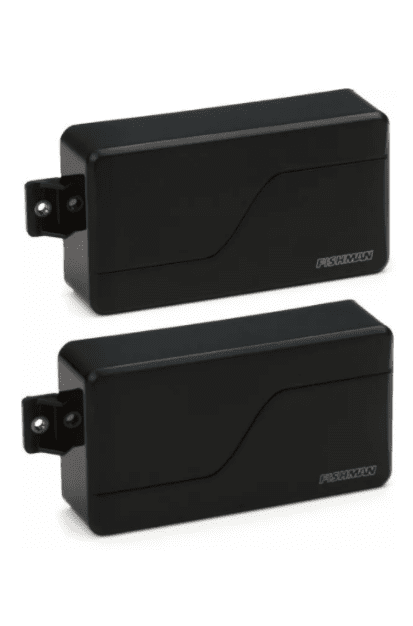
Fishman Fluence Modern
Exceptional clarity even with maximum gain.
Fishman has produced in the Fluence Modern, a pickup that practically eliminates hum and other interference, enabling high gain players to retain clarity, even with insane distortion.
Fishman took their sweet time to enter the unfathomably crowded electric guitar pickup market, but when they finally did in 2013, they forced the competition to stand up and take notice.
The Fluence Modern and Classic set offer the first revolutionary change to the traditional pickup designs in a long time. We think these pickups are absolute game-changers, thanks to their use of interconnected stacks of printed coils as opposed to the traditional wound-copper coils.
In simple terms, the coils were ‘applied’ rather than wound, which resulted in a super modern, multi-voice pickup that eliminated any semblance of hum, noise, or inductance in a way that wire-wound sets could never dream of. They were powered either through the USB backplate or a 9V lithium battery that lasts for up to 200 hours of play.
Tonally speaking, this cutting-edge set gave us amazing accuracy, exceptional clarity, and massive output. They sounded dynamic, powerful, and consistent, with insane balance across the entire tonal range.
The Fluence core pickups had two selectable voices, allowing them to function as either an active or passive set. This made them just that much more versatile. That said, they instinctively catered to the needs of modern- and heavier-metal guitarists due to the monstrous output.
If you’re not a metal player, you might be more interested in the Fishman Fluence Classic Set. The Classic set was relatively warm and mellow, and we think it caters well to musicians who seek more active clarity and classic tones, or who desire a vintage flavor.
Verdict: The Fishman Fluence Modern has found favor with Tosin Abasi, Devin Townsend, and Greg Koch, among others. Fishman’s re-imagined take on pickups is edgy, original, and incredibly versatile. They are highly recommended for modern and heavy genres, especially if you value clarity, heat, and a multi-voice capability to switch between fluid humbucker tones to active alnico sounds.
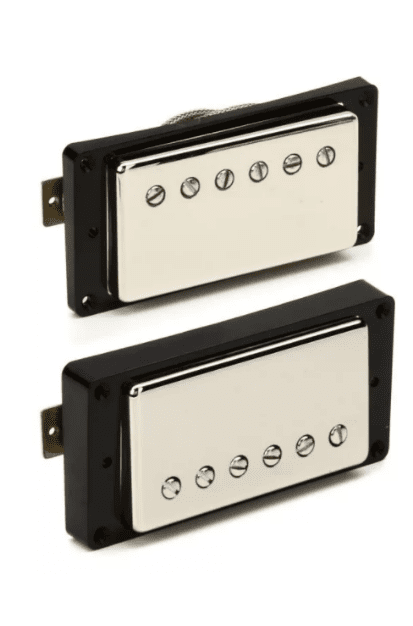
Seymour Duncan SH-55
The number one choice for players who demand perfect cleans and bell like clarity.
Seymour Duncan killed it with the SH 55, they provide exceptional clean tones and incredible articulation, both being absolute musts for jazz, and clean blues players.
The Seymour Duncan SH-55, also called the Seth Lover model, is a definitive option, celebrated for its celestial cleans and resounding projection. Many players prefer them to the lower-line stock pickups and Burstbuckers on account of the additional volume and clarity.
The SH-55 sounded great for jazz, fusion, and blues. We thought it best suited for guitarists who frequently use clean tones and mild overdrive, as the harmonics ring out with a tone that’s fat but still very well-defined. They gave us warmth, stellar clarity, and mids that come to life in low-gain situations.
We found they paired well with the all-mahogany bodies in Gibson and Epiphone models, as well as other Les Paul Style guitars with traditional mahogany construction. Plus, the swap was a painless and solder-free process for us, which should be the case for most LP-style guitars. In the bridge position, the pickup sounded bright, with a jazzy warmth and shimmer. The bottom end was full, thick, and open-sounding.
As mentioned, the mids came to life in low-gain situations, but cutting through a cluttered or busy band mix wasn’t exactly their strongest point. They occasionally begin to squeal and lose their grain when pushed too far. These PAF-style pickups shined with a 6/4/8 (bass/mid/treble) setting with overdriven power tubes.
Verdict: The Seymour Duncan SH-55 humbucker is best described as a fat-sounding bridge pickup with a vintage touch. Other brands have tried to replicate the SH-55, but the replicas pale in comparison. SD is privy to Seth Lover’s original design, which gives them a real leg up on the competition. Their incredible purity brings arpeggios to life, and they can serve up crunchy blues (think Gary Moore) or the kind of saturated tones that you’ve no doubt heard on the biggest hard-rock albums of the ‘80s.
Seymour Duncan Alnico II Pro Slash APH-2 – Best Les Paul Pickup for Classic Rock
Slash’s unique style and guitar tone have inspired many guitarists to seek out ways to sound like him. If you’re not running a modeling or profiling rig, and you’re trying to find the best way to get authentic Appetite for Destruction tones, the Seymour Duncan Pro Slash APH-2 signature humbuckers offer the definitive solution.
These pickups, also used in the Les Paul Slash Signature model, are available in a variety of color options that include black, nickel, Zebra, and reverse Zebra. The mag wire and winding on this specific model were adjusted to emulate the tones Slash milked from his Derrig LP copy back in the ’80s.
The end result was a tone with an unmistakable fullness in the mid-range, massive crunch, and practically infinite sustain. Like some of the other choices in this roundup, we found these pickups were able to do so much more than their name implied. They were surprisingly versatile and did cleans as well as they did screaming overdrive.
Whether it was powerful riffs or tasty lead tones, the APH-2s sounded fat, and really commanded attention. As a neck-position pickup, we thought they were sweet and warm, especially with a little light distortion or overdrive. In the bridge position, they roared to life with punchy mids, distinct clarity, and shimmering highs.
They gave us huge output and a ton of sustain with excellent note separation for chord work. All things considered, the pickups worked best for rock, blues, and metal. Unless you’re looking for massive output for heavier modern metal styles, we think you won’t be disappointed.
Check out the chest-punching impact of APH-2 in action in this video:
Verdict: The Seymour Duncan Pro Slash APH-2 humbucker is a phenomenal choice for rock, blues, and metal guitarists. They offer a classic tone with tons of sustain, with crunchy mids sprinkled in for good measure. If you need some high-end humbuckers that deliver high-quality tones, this signature set promises just that.
How to Choose the Right Pickups for You
When it comes to upgrading your pickups, you might find yourself wondering what the differences are between the various styles on the market. Keep on reading to learn how to distinguish between the different types of pickups and how to decide which ones will work best for you.
P90s vs. Humbuckers
P90s
P-90s are, at heart, single-coil pickups that look similar to humbucker pickups. They have one pole piece with fewer coil wraps. They were first introduced by Gibson in 1946 as an alternative to the Fender single-coils, but they really came into their own during the punk-rock era.
Modern P90 pickups have a coiled wire around a plastic pole (bobbin), and two Alnico bar magnets, and they use wire coiled around plastic bobbins with Alnico magnets.
Generally, they are not interchangeable with humbuckers. The route for a P90 is narrower and wider. However, manufacturers have started making interchangeable P90s and humbucker pickups.
Tone-wise, P90s are known for their dirty and gritty tones. They yield a bright, thin, and crispy sound that is close to a Fender single-coil (but not the same). They are raspy and have more warmth in the lows compared to single-coils.
P90s are often described as the middle ground between a humbucker and a Fender single-coil – the best of both worlds. However, they are not ‘hum canceling’ and will produce noise if you crank up the gain (although they are still quieter than Fender single-coils due to their wider magnet). Their spark, transparency, and definition make them suitable for funk, blues, jazz, rock, and country genres.
Humbuckers
Humbuckers are electric guitar pickups that use two coils with reversed polarity to cancel electromagnetic interference. This interference usually refers to ‘mains hum’ and the pickups ‘buck the hum’ – hence the name. They were designed by Seth Lover and were first introduced by Gibson in 1955, and genuinely went on to revolutionize music as we know it.
Humbuckers are favored by jazz, rock, and metal players for their ‘thick‘ sound. This fat, round, and smooth tone results from their focus on the midrange frequencies. They are built to handle gain and distortion much better than any other type of pickup.
However, single-coil enthusiasts often accuse humbuckers of lacking tonal ‘personality’ and dynamism. While that may be subjective, there is no doubting the fact that the heavy mahogany bodies of Gibson and Epiphone models pair brilliantly with humbuckers.
Generally, humbuckers are the pickup of choice for rock and metal guitarists who want punchy frequency selection and warmth in clean and distorted tones. However, they aren’t that great for pristine arpeggios or bright, jangly rhythm work.
Active vs. Passive
The other debate when upgrading pickups is whether to go for active or passive.
Active Pickups
Active pickups are so named because they rely on an active external power source, typically a 9v battery, although these days, some are even USB rechargeable. Because they use power from an external source, they aren’t relying on the weak electrical current generated by the electromagnetic coil as with traditional passive pickups. Therefore, they have a higher output. This makes them extremely popular with guitarists who play heavier styles, as they can handle much higher levels of gain and distortion while retaining clarity.
The biggest downsides of active pups are the increased price as well as the fact that if the batteries die mid-performance, the guitar becomes practically useless until you replace them.
Passive Pickups
Passive pickups are your standard electromagnetic pickups, which generate electrical current as a result of the string cutting in and out of the magnetic field created by their coils. They do better with expressive playing, as they are better able to pick up on delicate and subtle tones than their passive counterparts. And they are a much more affordable option.
Of course, the downside to a passive pickup is its reduced capacity to handle high gain, although good-quality passive pickups don’t tend to suffer too badly here.
Final Thoughts on the Best Les Paul Pickups
There are tons of great options for upgrading your pickups, although there’s a good reason the list is stacked with Seymour Duncan pickups – they tend to really nail the Les Paul sound – regardless of genre.
Making this modification can completely transform the sound and performance of your guitar and potentially cure your GAS if you’ve been pining for an upgrade. To recap, our favorite pickups for Les Paul guitars are as follows.
- Seymour Duncan Pearly Gates – Best Hard Rock/Alternative
- Seymour Duncan Hot Rodded Humbucker Set – Best for Modern Rock/Metal
- EMG 81/85 – Best for Thrash Metal
- Seymour Duncan SPH90 Phat Cat P90 – Best P90 Pickups
- Fishman Fluence Modern – Best for Modern Metal
- Seymour Duncan SH-55 – Best for Jazz/Blues
- Seymour Duncan Alnico II Pro Slash APH-2 – Best for Classic Rock
Remember, you can make any of the above hotter or tamer by adjusting the pickup height to taste.
Don’t forget to take a look at KGR’s Les Paul Upgrade Guide. It features a comprehensive list of simple-to-intermediate upgrades to transform your instrument’s tone and playability.

